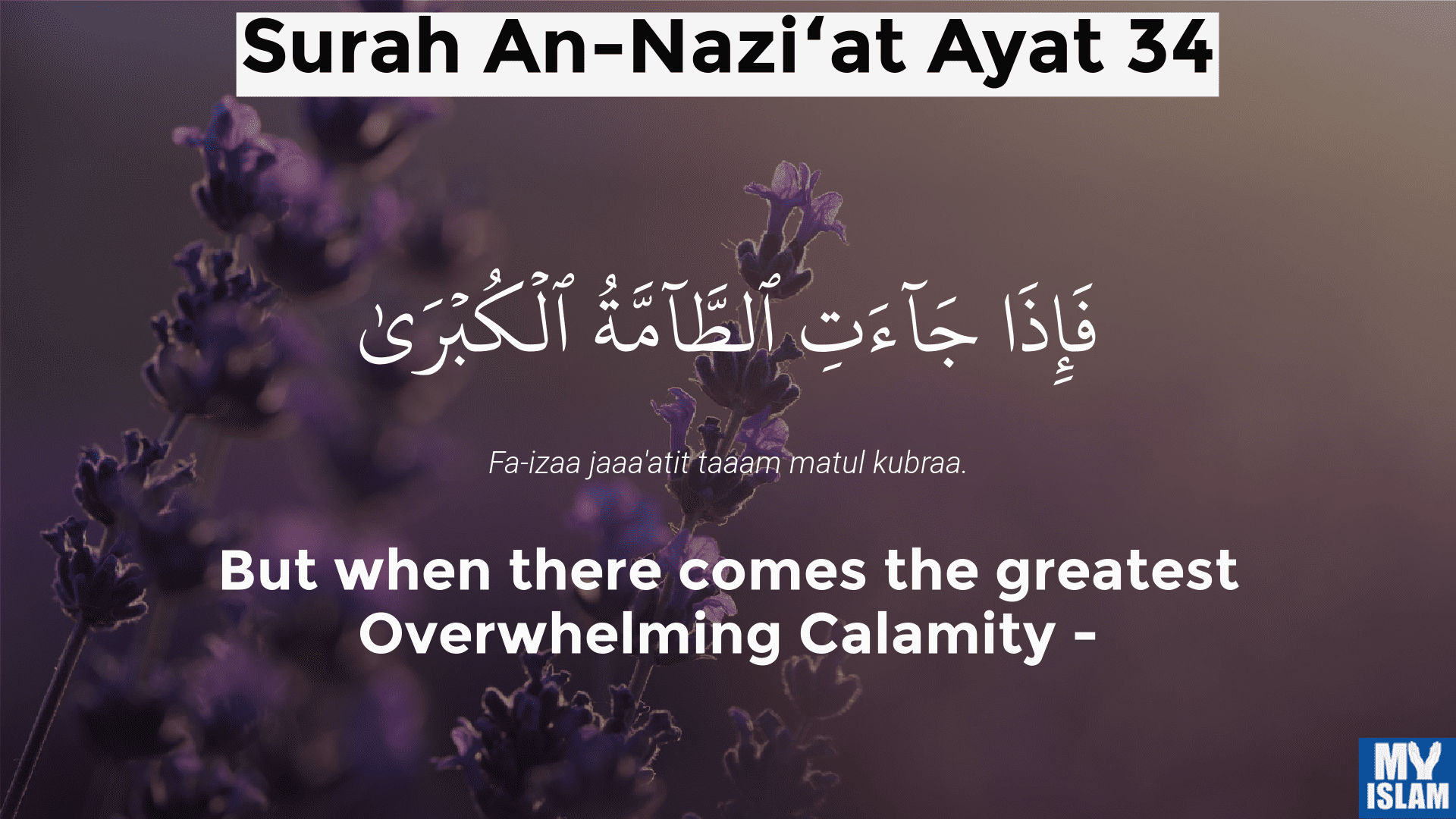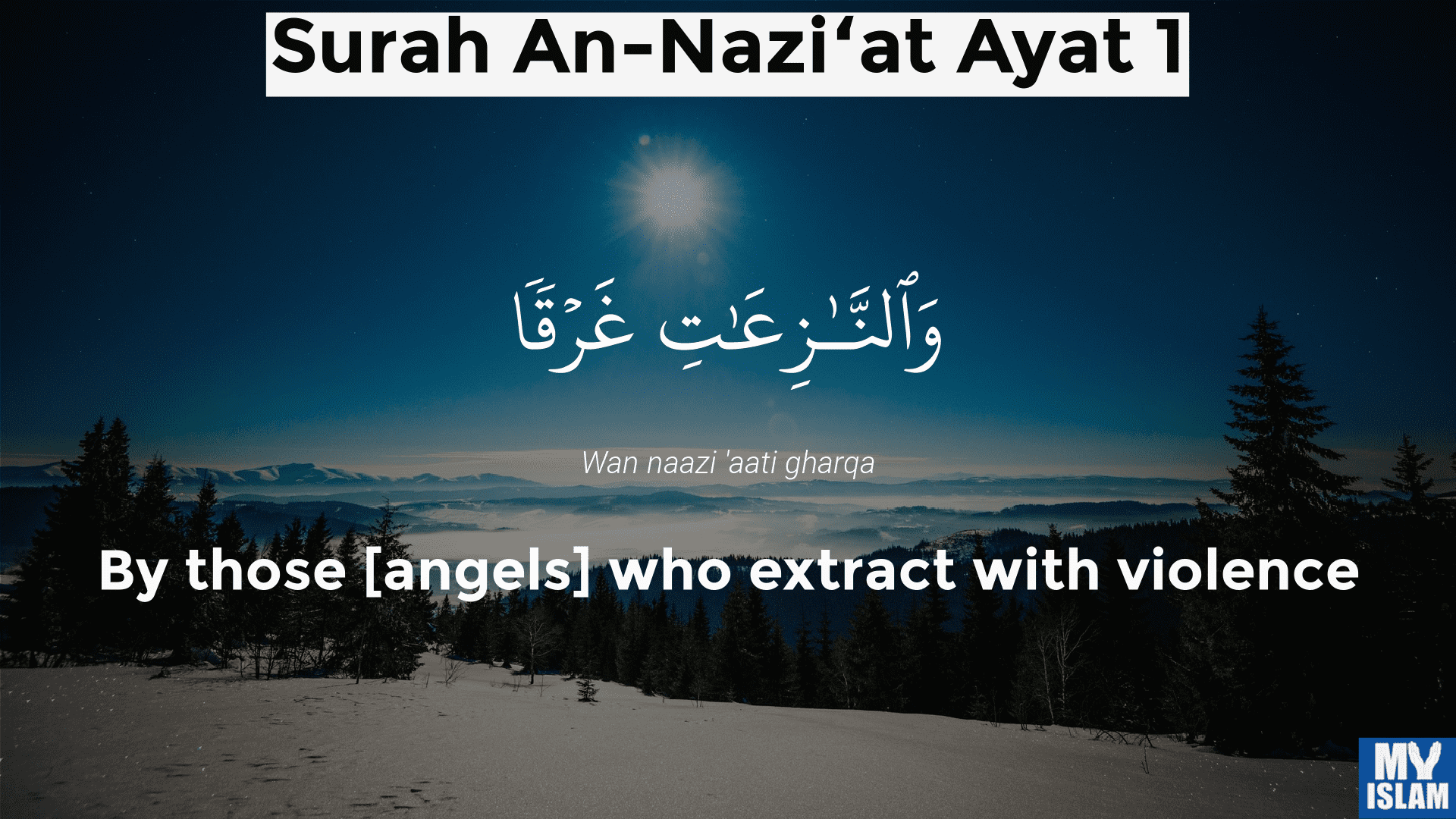Surah Nazi’at Ayat 34 in Arabic Text
English Translation
Here you can read various translations of verse 34
But when there comes the greatest Overwhelming Calamity –
Therefore, when there comes the great, overwhelming (Event),-
But when the great calamity will come about
But when there comes the greatest catastrophe (i.e. the Day of Recompense, etc.),
But when the great disaster cometh,
So when the Greatest Catastrophe comes,
When the great overwhelming event arrives
پس جب وه بڑی آفت (قیامت) آجائے گی
Quran 79 Verse 34 Explanation
For those looking for commentary to help with the understanding of Surah Nazi’at ayat 34, we’ve provided two Tafseer works below. The first is the tafseer of Abul Ala Maududi, the second is of Ibn Kathir.
Ala-Maududi
(79:34) But when the great calamity will come about[19]
19. This implies the Resurrection for which the words at- Taammat alkubra have been used. Taammah by itself is a grievous calamity which afflicts everybody. Then it has been further qualified by the word kubra (great), which shows that the mere word taammah is not enough to describe fully its intensity and severity.
Ibn-Kathir
34. But when there comes the Greatest Catastrophe 35. The Day when man shall remember what he strove for. 36. And Hell shall be made apparent for whoever sees. 37. Then for him who transgressed 38. And preferred the life of this world, 39. Verily, his abode will be the Hell; 40. But as for him who feared standing before his Lord, and forbade himself from desire. 41. Verily, Paradise will be his abode. 42. They ask you about the Hour when will be its appointed time 43. What do you have to mention of it. 44. To your Lord it is limited. 45. You are only a warner for those who fear it, 46. The Day they see it (it will be) as if they had not tarried (in this world) except an (`Ashiyyah) afternoon or its (Duha) morning.
Allah says,
(But when there comes the Great Catastrophe) This refers to the Day of Judgement. This has been said by Ibn `Abbas. It has been called this because it will overcome every matter. It will be frightful and horrifying. As Allah says,
(And the Hour will be more grievous and more bitter.) (54:46) Then Allah says,
(The Day when man shall remember what he strove for.) meaning, at that time the Son of Adam will reflect upon all of his deeds, both the good and the evil. This is as Allah says,
(On the Day will man remember, but how will that remembrance avail him) (89:23) Then Allah says,
(And Hell shall be made apparent for whoever sees.) meaning, it will become apparent for the onlookers, so the people will see it with their own eyes.
(Then for him who transgressed) meaning, who rebels and behaves arrogantly.
(And preferred the life of this world,) meaning, he gives it precedence over the matters of his religion and his Hereafter.
(Verily his abode will be the Hell;) meaning, his final destination will be Hell, his food will be from the tree of Zaqqum, and his drink will be from Hamim.
(But as for him who feared standing before his Lord and forbade himself from desire.) meaning, he fears the standing before Allah, he fears Allah’s judgement of him, he prevents his soul from following its desires, and he compels it to obey its Master.
(Verily Paradise will be his abode.) meaning, his final abode, his destination, and his place of return will be the spacious Paradise. Then Allah says,
(They ask you about the Hour — when will be its appointed time What do you have to mention of it. To your Lord it is limited.) meaning, its knowledge is not with you, nor with any creature. Rather the knowledge of it is with Allah. He is the One Who knows the exact time of its occurrence.
(Heavy is its burden through the heavens and the earth. It shall not come upon you except all of a sudden. They ask you as if you have a good knowledge of it. Say: “The knowledge thereof is with Allah.”) (7:187) Allah says here,
(To your Lord it is limited.) Thus, when Jibril asked the Messenger of Allah about the time of the last Hour he said,
(The one questioned about it knows no more than the questioner.) Allah said,
(You are only a warner for those who fear it,) meaning, `I sent you to warn mankind and caution them to beware of the torment and punishment of Allah. So whoever fears Allah, fears standing before Him, and His threat, then he will follow you, and thus be successful and victorious. However, whoever denies you and opposes you, then he will only suffer loss and failure.’ Allah then says,
(The Day they see it (it will be) as if they had not tarried (in this world) except an (`Ashiyyah) afternoon or its (Duha) morning.) meaning, when they stand up from their graves to go to the place of Gathering, they will feel that the period of the worldy life was short, it will seem to them that it was only the afternoon of one day. Juwaybir reported from Ad-Dahhak from Ibn `Abbas:
(The Day they see it (it will be) as if they had not tarried (in this world) except an (`Ashiyyah) afternoon or its (Duha) morning.) “As for `Ashiyyah, it is the time between noon until the setting of the sun.
(Or its (Duha) morning) what is between sunrise and midday (noon).” Qatadah said, “This refers to the time period of the worldly life in the eyes of the people when they see the Hereafter.” This is the end of the Tafsir of Surat An-Nazi`at. And to Allah belongs all praise and thanks.
Quick navigation links






